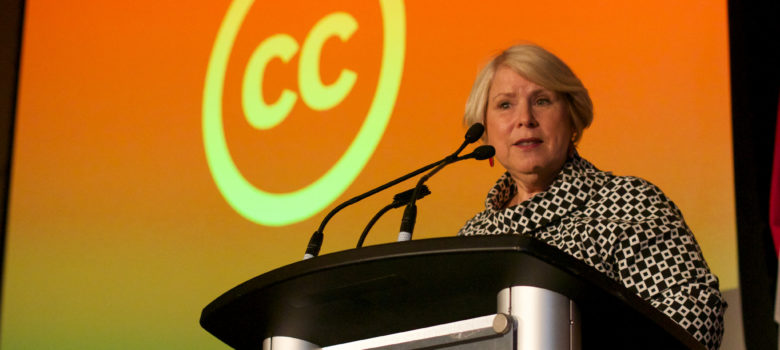The Creative Commons Global Summit was held in Toronto over the weekend, bringing hundreds of people together from around the world to discuss issues ranging from copyright reform to enhancing collaboration and sharing. As part of the opening of the event, David Lametti, the Parliamentary Secretary for the Innovation, Science and Economic Development, and Deb Matthews, the Ontario Minister for Advanced Education and Skills Development as well as the Minister for Digital Government, both provided words of welcome. Their presence demonstrated how far openness, access, and balanced copyright have come in recent years. Lametti, a leading voice on copyright as McGill law professor, emphasized the important role of balance and flexibility in the copyright system, while Matthews provided a unequivocal endorsement of openness and access.
Matthews provided more than just encouraging words, however. She used her opening remarks to promote the creation of a new Open Textbook Library for Ontario that will feature hundreds of openly licensed, professionally created textbooks providing students with access to free digital texts in dozens of university and college courses.
The open library is managed by eCampusOntario, which is working with BCcampus to make the texts available to students in the province. In fact, the provincial government is investing millions in creating new open texts in a myriad of subjects including history, finance, politics, the environment, engineering, and the sciences.
The Ontario government support for open textbooks is notable for several reasons. First, it points to the growing importance of openness in education, including open access publishing of scholarly research, open educational resources, open courses, and open texts. Governments increasingly recognize the importance of investing in open education to support learners at all stages of their lives. Second, the open textbook model provides a cost-effective alternative to expensive textbooks and licences. The works are paid for, but once created, can be freely used and modified without the need for further licences, payments or permissions. Third, this provides a strong rebuttal to those who suggest that open textbooks may be inferior to the pricey, publisher versions. Indeed, the open textbooks are written by teaching professionals, peer reviewed, and professionally developed in the same manner as commercial textbooks. The difference is that once created, they can be freely used, reused, and modified. The approach represents a win-win-win-win scenario: free textbooks for students, reduced long-term costs for education and government, financial support and compensation for creators of the texts, and high quality, Canadian materials freely available for use by teachers across the province.








excellent, and about time
public exams are next; pay your fees, write the bar, ect.
( do you still have to be regiistered as ( anything to hang up a weight-loss /acupuntuce/ smoking clinic)
gvien a PC approach to getting things done vs the corruption but functional tream, what comes out of this should be inyteresting.
hacking kindles like wikipedia, probably.
Pingback: Don Gorges April 8 to May 1 | Don Gorges
Pingback: Open Textbooks | The Instructor's Voice
They’re actually doing it? I’ve been hoping for this for decades.
Next stop, open lecture videos…
Pingback: Canadian History Roundup – Week of April 30, 2017 | Unwritten Histories